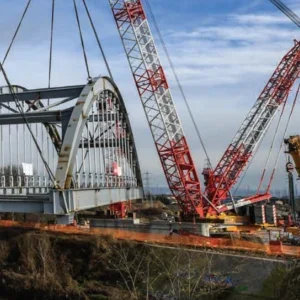While waiting in the foyer of National Equipment Services’ plush corporate head offices in the Chicago suburb of Evanston, in walked a handful of suits. They are from Morgan Stanley – investment bankers, or maybe analysts. The receptionist clearly knows them. NES is unlike most other construction equipment rental companies. It does not purport to be in the crane business, like other companies we may be more familiar with. It is in the ‘business’ business.
NES was established in June 1996 by the Chicago investment firm Golder Thoma Cressey Rauner with the specific single aim of consolidating the equipment rental market. Kevin Rodgers was recruited from the US subsidiary of the Australian rental company Brambles to run the new business, and the first acquisition was made in January 1997. Since then it has made more than 35 acquisitions, including the crane companies Cormier Equipment (Oakland, Maine), Falconite (Paducah, Kentucky), R&R Crane (Houston, Texas), Shaughnessy Crane Service and Wellesley Crane Service (both of Boston, Massachusetts). Collectively, the total crane fleet is around 700 units. NES floated on the New York Stock Exchange in July 1998.
NES is not busiest of the consolidators, however. There were 220 mergers in the US equipment rental business in 1998, with United Rentals leading the way. In the first six months of this year, United Rentals acquired 46 companies and at the mid-year point had letters of intent for a further 39. But NES is the only general rental company that is moving firmly across into cranes, rejecting received wisdom that cranes are a different type of business from general equipment.
I am in Evanston to meet NES chief operating officer Jim O’Neil and to learn what NES is up to.
NES occupies the 16th floor of a modern office block. O’Neil’s office offers a magnificent view over Lake Michigan. Responding to my reaction, he takes me to the other side of the building to show me an equally impressive view of the Chicago skyline.
There are many empty desks. These are new offices, O’Neil explains, and space is needed for the planned growth of between 30% and 50% a year for the next five years. Though acquisitions remain the cornerstone of growth, the general rental market is expected to grow by between 10% and 15% a year for the foreseeable future.
The corporate centre will never be big, he adds, as the company has a strong decentralisation strategy. Currently there are 10 people in these offices, to support a group with sales of $560m (annualised, September 1999). There is desk space for a full complement of 24.
O’Neil is a Canadian national. He joined NES in 1997 when it acquired his company Sprintank, a portable liquid storage tank rental house. He was made chief operating officer of NES in September 1998.
He explains the NES way of working: “Most rental companies are under-capitalised. What we do is take away the things that they probably didn’t like, like insurance, tax etc., and provide them with capital.” As far as employees and clients are concerned, he says, nothing changes when a company is acquired by NES. “Employees will get better benefits and a pension programme but nothing else changes.” Acquired companies have been merged occasionally, but NES has seven equipment companies in Houston which have been kept as separate entities because they operate in different niche markets, even though there may be an overlap among their customers.
O’Neil says that companies are generally left to continue as before, with as little interference as possible, because NES is only interested in successful companies. “We’re not in the business of buying ailing companies. We’re not in the turnaround business, we’re in the growth business. We get a much better bang for the buck growing profitable businesses.” O’Neil says that NES will make contact with perhaps half of the companies that it hears about as potential takeover candidates. In broad terms, for every 10 it makes contact with, it may talk seriously to five, get deep into detail with two and close a deal with one. In the first nine months of this year, NES looked at about a dozen crane companies and made just the one acquisition – Wellesley. The sticking point is usually price, he says. Egos have a habit of over-valuing companies.
Sometimes companies come to NES asking to be acquired, sometimes brokers act as intermediaries, and sometimes NES goes fishing itself. Takeovers are never hostile, however.
In the crane business only about half the rental companies are sufficiently profitable to be interesting to NES, O’Neil says, compared with 80% of aerial work platform companies.
“Cranes probably have a higher reject level with us as an industry,” he says. “Unlike the aerials business, there’s a great diversity of financial health and quality of earnings.” What sets NES apart from the other consolidators in the equipment business, like United or Hertz, is that it is “more speciality oriented”, says O’Neil, hence its interest in cranes. However, unlike many crane rental specialists, it regards cranes merely as a commodity and not as a service industry.
In direct contrast to the Anthonys and AmQuips of the crane business, NES is not greatly interested in providing lifting services for construction contractors. Instead, its target business in cranes is providing bare rental pick and carry machines, of capacities under 35t, to industrial end-users.
Does NES have international ambitions? O’Neil shrugs. “Who knows?” he says. “We are smart enough to know that there are no rules.” He points out, however, that both the CEO, Rodgers, and chief financial officer Dennis O’Connor have strong overseas experience. (Rodgers was a Caterpillar dealer in Australia before returning to the USA to head up Brambles.) With the UK’s Rentokil Initial putting its plant operations up for sale – which includes a strong US presence as well as UK-based crane rental firm Initial GWS – the opportunity is there, if the numbers prove attractive.
NES has specific growth targets in some sectors, but a more pragmatic approach is taken to cranes. “We are not trying to be a consolidator in the crane business,” O’Neil says. “We are a consolidator in the rental business. Were not trying to be an Anthony.”






